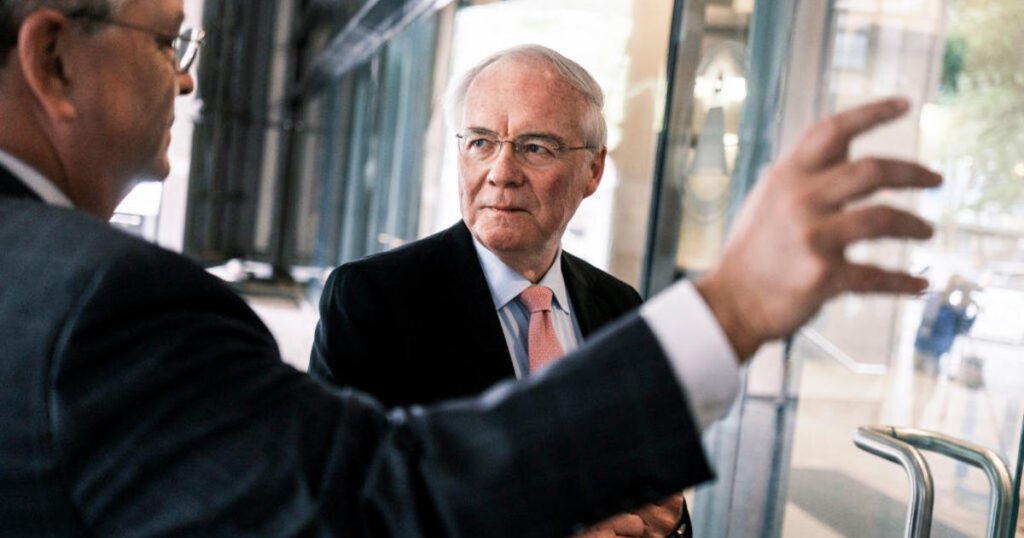The chief government officer of Kroger insisted Wednesday that merging with rival Albertsons would permit the 2 grocery store corporations to decrease costs and extra successfully compete with retail giants like Walmart and Amazon.
Kroger CEO Rodney McMullen argued in favor of what can be the biggest grocery chain merger in U.S. historical past whereas testifying throughout a federal courtroom listening to in Oregon on the U.S. authorities’s request for a preliminary injunction that might block the $24.6 billion deal.
“The day that we merge is the day that we’ll start reducing costs,” McMullen mentioned whereas underneath questioning by a lawyer representing his firm.
Jordan Gale/Bloomberg by way of Getty Photos
The 2 corporations proposed becoming a member of forces in October 2022 after Kroger agreed to buy Albertsons. The Federal Commerce Fee sued early this yr to stop the deal, alleging the merger would get rid of competitors and lift grocery costs at a time of already excessive meals value inflation.
McMullen countered that argument by saying that Albertsons costs are 10-12% greater than Kroger’s and that the merged firm would attempt to scale back that disparity as a part of a method for protecting clients. Walmart now controls round 22% of U.S. grocery gross sales. Mixed, Kroger and Albertsons would management round 13%.
“We all know that pricing goes to proceed to go down,” McMullen mentioned.
His statements and the upcoming testimony of Albertsons CEO Vivek Sankaran have been anticipated to be crucial parts of the three-week listening to, which is at its mid-point. What the 2 say underneath oath about costs, potential retailer closures and the affect on employees will doubtless be scrutinized within the years forward if the merger goes by means of.
Kroger, based mostly in Cincinnati, Ohio, operates 2,800 shops in 35 states, together with manufacturers like Ralphs, Smith’s and Harris Teeter. Albertsons, based mostly in Boise, Idaho, operates 2,273 shops in 34 states, together with manufacturers like Safeway, Jewel Osco and Shaw’s. Collectively, the businesses make use of round 710,000 folks.
In the course of the U.S. District Courtroom proceedings, FTC attorneys argued that within the 22 states the place the 2 corporations compete now, they carefully match one another on value, high quality, personal label services like retailer pickup. Customers profit from that competitors and would lose out if the merger is allowed to proceed, they mentioned.
USC advertising professor Anthony Dukes advised CBS Information that he believes the FTC’s argument is not essentially correct.
“I am not satisfied of that argument,” Dukes mentioned. “So in the event that they’re one way or the other capable of mix their shops, a few of these value financial savings by means of decrease wholesale costs may very well be handed on to shoppers.”
In accordance with the CBS MoneyWatch value tracker, since 2019, the typical value of a dozen eggs has risen 126%, whereas the value of a loaf of bread jumped 54%, and a pound of hen breast rose 33%.
However wages additionally rose 23% over that interval, based on the Bureau of Labor Statistics.
“However that is not how a whole lot of shoppers suppose, they only see that grocery invoice on the finish,” Leo Feler, chief economist for the patron information firm Numerator, advised CBS Information. “And so they’re like, ‘Oh my gosh, that is so costly.’ And so they’re proper.”
The FTC and labor union leaders additionally declare that employees’ wages and advantages would decline if Kroger and Albertsons not compete with one another. They’ve moreover expressed concern that potential retailer closures may create so-called meals and pharmacy “deserts” for shoppers.
Albertsons has argued the deal may truly bolster union jobs, since a lot of it and Kroger’s rivals, like Walmart, have few unionized employees.
Below the deal, Kroger and Albertsons would promote 579 shops in locations the place their places overlap to C&S Wholesale Grocers, a New Hampshire-based provider to impartial supermarkets that additionally owns the Grand Union and Piggly Wiggly retailer manufacturers.
Talking in 2022 earlier than the U.S. Senate subcommittee on competitors coverage, antitrust and client rights, the Albertsons CEO mentioned his firm’s acquisition of manufacturers equivalent to Safeway over the earlier decade had allowed it to extend the variety of its shops from 192 to 2,300.
“The intent is to not shut shops. The intent is to divest shops,” Sankaran mentioned on the time.
The FTC alleges that C&S is ill-prepared to tackle these shops. Laura Corridor, the FTC’s senior trial counsel, cited inner paperwork that indicated C&S executives have been skeptical in regards to the high quality of the shops they’d get and might want the choice to promote or shut them.
C&S CEO Eric Winn, for his half, testified final week in Portland that he thinks his firm might be profitable within the enterprise.
The FTC is in search of a preliminary injunction to dam the merger whereas its lawsuit towards the deal goes earlier than an administrative regulation decide. U.S. District Decide Adrienne Nelson was anticipated to listen to from round 40 witnesses earlier than deciding whether or not to subject the injunction.
If she does determine to quickly block the merger, the FTC plans to carry the in-house hearings beginning Oct. 1. Kroger sued the FTC final month, nevertheless, alleging the company’s inner proceedings are unconstitutional and saying it needs the merger’s deserves determined in federal courtroom.
The attorneys normal of Arizona, California, the District of Columbia, Illinois, Maryland, Nevada, New Mexico, Oregon and Wyoming all joined the FTC’s lawsuit on the fee’s aspect. Washington and Colorado filed separate circumstances in state courts in search of to dam the merger.
